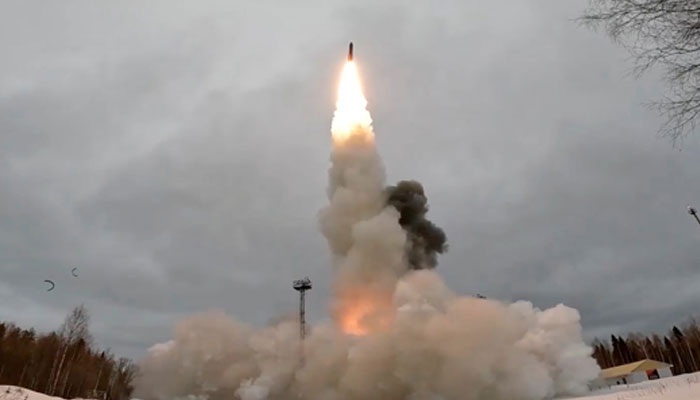Where war ends, grief begins
Squadron Leader Usman Yousaf isn’t an easy man to forget
Who won the war? Who had the better press conference? Who did better PR? The diversity of the Indian press briefing or the heartthrob appeal of Aurangzeb?
In all this media noise, those who died have been forgotten as mere numbers. The innocent killed by the mysterious four men in Pahalgam and those who chose to lay their lives in the line of duty are overlooked. Not only the victims but their mothers and wives have been forgotten too.
Khadija received a call from her physically exhausted husband just before 11 am. He said, “I’m nearly done. I’ll pick up my flu tablets when I return for lunch.” Despite his stressful schedule, they had his friends over for dinner the night before. Usman wasn’t the sort to worry about tomorrow; he lived in the moment, guided by his heart rather than material gain.
Only last week, he told his wife not to be scared of the high alert and to go meet her friend. After all, there wasn’t much to do in the harsh, desolate town they had lived in for two years. She needed a break from her two little girls. As if manifesting what he desired, he told Khadija to start thinking about her own career now that the older child was five. “You need to be a role model for your daughters”, he suggested gently.
He was already little Izzah’s hero. No one was as good as her dad. Only yesterday, she asked her uncle why he couldn’t park the car as quickly as her papa did. Taimur managed a weak smile. Usman, only a year younger than Taimur, had been his partner in crime always.
Occasionally, in his zeal to help, he could end up hurting those he loved so much. Like last Eid, when they were together, Taimur, had been busy burning some old papers, and Usman, with his typical bouncy energy, took the poker from him and accidentally touched his older brother's foot with the hot rod. Taimur smiles and says, "Perhaps Usman wanted to leave a mark on me so I wouldn't forget him."
Squadron Leader Usman Yousaf isn’t an easy man to forget. His staff tell stories of how he could tell if anyone on his team was struggling with a domestic issue. Whether it was leave to sort out an ill parent’s scan or an argument with the wife, Usman was a boss who looked after his juniors.
This concern for the safety of his subordinates and his oath of service to protect the assets of his much-loved country made him return to the hangar that fateful day to check if everyone and everything was out of danger.
Usman’s father describes how his son had been inspired by the story of a handsome martyr from Afghanistan who had to be reburied after his grave was affected by floods. Locals say that the buried martyr’s body was as if he had just been buried. Usman’s father had been praying for almost a month that he himself should die a martyr.
As the ageing father recited Quranic verses in a soul-stirring fashion from memory and explained their meaning, I saw a man hurting from the loss of his tall, burly son comforting himself with the proud knowledge that Usman had stepped up and embraced Shahadat because this is a Momin’s ultimate desire.
The little girls can sense that something has changed. They cry, unable to be distracted by smartphones and cartoons. I sat them on my knee and made them promise me that they would look after their mom. While Izzah promised earnestly that she would, the younger Irhaa gave me food for thought when she replied, “I can’t.”
As I look into a young widow’s eyes, I am reminded of the same vacant look that I have seen in the eyes of other young women waiting for their husbands to return. Khadija forgets during the day that her loving husband is no more. She is more shell-shocked than the base that was targeted.
I get up to hug her, but not a single tear fills her eyes. She has the nerves of a stoic – or perhaps she is just the proud wife of a great man who was a hero long before the war.
His mother, a local school teacher, had immediately recognised me as a family friend and a neighbour. Usman was my nephew's age and well-known in his social circle. As I turned onto the street to reach Usman's home, I was overcome by the realisation that I had spent so much time in this neighbourhood, going to the same chicken corn soup stand, cake shop and stationers where this young man grew up. I was not only connected by a geographical history and the nostalgia of familiar sounds and sights, but most importantly by the present reality of my family living nearby.
India and Pakistan are the same, connected by past, present, and future. Only war brought me and Usman's mother together. I had never thought of them before, and as one mother asked another mother, "What do you think Usman deserves?”
I replied, “The highest honour, the highest award of the land.” However, that night, as I said a quiet prayer, I thought that perhaps more than medals, the highest honour would be not to widow and orphan any more families.
The writer is a journalist, writer, filmmaker and political activist.
-
 Detective Chief Inspector Reveals How Andrew Got Treated In Police Custody
Detective Chief Inspector Reveals How Andrew Got Treated In Police Custody -
 Gemini 3.1 Pro Unveiled: Google’s Next-gen AI For Advanced Reasoning & Faster Enterprise Workflows
Gemini 3.1 Pro Unveiled: Google’s Next-gen AI For Advanced Reasoning & Faster Enterprise Workflows -
 Oprah Winfrey Talks About Weight-loss 'tool To Manage' Health
Oprah Winfrey Talks About Weight-loss 'tool To Manage' Health -
 Texas Emerges As World's Future Data Center Capital
Texas Emerges As World's Future Data Center Capital -
 South Korea’s Ex-President Yoon Issues Public Apology After Being Sentenced To Life Over Martial Law
South Korea’s Ex-President Yoon Issues Public Apology After Being Sentenced To Life Over Martial Law -
 Eric Dane Recorded Episodes For The Third Season Of 'Euphoria' Before His Death From ALS Complications
Eric Dane Recorded Episodes For The Third Season Of 'Euphoria' Before His Death From ALS Complications -
 Inside Morning Of Andrew’s Arrest And How He Responded: ‘Do You Know Who I Am?’
Inside Morning Of Andrew’s Arrest And How He Responded: ‘Do You Know Who I Am?’ -
 OpenAI Sam Altman Predicts AI Superintelligence By 2028: Is Humanity Ready For A Turning Point?
OpenAI Sam Altman Predicts AI Superintelligence By 2028: Is Humanity Ready For A Turning Point? -
 WhatsApp Rolls Out Group Message History To Ease Group Chats
WhatsApp Rolls Out Group Message History To Ease Group Chats -
 Tesla Expands Cybertruck Lineup With Affordable Model In US, Slashes Cyberbeast Price To Boost Demand
Tesla Expands Cybertruck Lineup With Affordable Model In US, Slashes Cyberbeast Price To Boost Demand -
 AI Is Not As Powerful As We Think, Says Mathematician Hannah Fry
AI Is Not As Powerful As We Think, Says Mathematician Hannah Fry -
 How Andrew's Feeling Since His Arrest & Subsequent Release Amid Tech & Computers Seize
How Andrew's Feeling Since His Arrest & Subsequent Release Amid Tech & Computers Seize -
 Trump Officially Directs US Agencies To Identify And Release Files On Extraterrestrial Life
Trump Officially Directs US Agencies To Identify And Release Files On Extraterrestrial Life -
 2026 Winter Olympics: Alysa Liu Claims Gold, Snapping 20-year Drought For US Figure Skating
2026 Winter Olympics: Alysa Liu Claims Gold, Snapping 20-year Drought For US Figure Skating -
 Hilary Duff Opens Up About Marriage Fears Despite Strong Bond With Matthew Koma
Hilary Duff Opens Up About Marriage Fears Despite Strong Bond With Matthew Koma -
 ‘Grey’s Anatomy’ Star Eric Dane Breathes His Last At 53
‘Grey’s Anatomy’ Star Eric Dane Breathes His Last At 53




